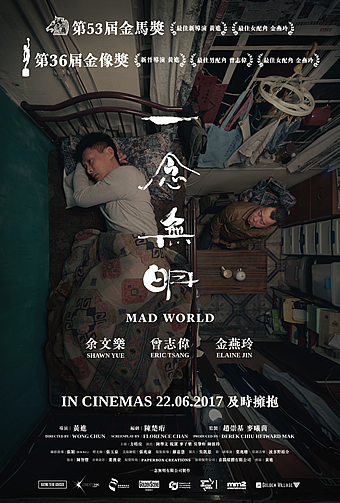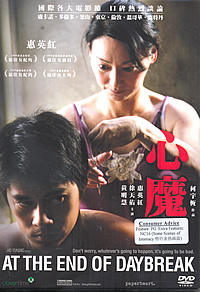SHUTTLE LIFE (分贝人生) (2018)
Genre: Drama
Director: Tan Seng Kiat
Cast: Sylvia Chang, Jack Tan, Angel Chan, Jack Yap, Justin Lan, Gan Wei Yan
Runtime: 1 hr 31 mins
Rating: M18 (Coarse Language)
Released By: mm2 Entertainment
Official Website:
Opening Day: 25 January 2018
Synopsis: Ah Qiang lives in the big city and struggles to take care of his mentally-unstable mother and his 5-year-old sister, Hui. When a speeding car kills Hui in an accident, Ah Qiang is desperate to claim his sister’s body. Unfortunately, he can’t prove his relation with Hui as she was never registered at birth. Ah Qiang’s mother is no help either given her condition, and Ah Qiang is forced to face this predicament on his own.
Movie Review:
‘Shuttle Life’ begins with the brother-and-sister pair Zhi Qiang (Jack Tan) and Hui Shan (Angel Chan) scouring for water for their household – first, Qiang climbs up several storeys to a decrepit water tank, only to find that it has dried up; then, he camps out with Shan in the cubicle of a public toilet to wait for the cleaning lady to deposit a huge bucket of water meant for washing hands. Such are the protagonists of director Tan Seng Kiat’s feature filmmaking debut, an intimate, spare and often unflinching family drama grounded in the grind and grime of daily life for the lower-middle class of society living in and around the Malaysian capital of Kuala Lumpur.
As it turns out, Qiang has assumed the role of caretaker for his family after his mother Li Jun (Taiwanese actress Sylvia Chang) was diagnosed with mental disorder. In the only scene with all three of them, Qiang prepares a simple dinner at home with three red eggs to celebrate Shan’s birthday, and it is clear just from watching them at the dining table alone that Shan – played with just the right balance of innocence and maturity by Chan – is the very spark that lights up their lives and even the glue that holds the whole family together. Qiang brings her out after to continue the celebration with his do-no-gooder buddies Fei and Bao Tou, but before the night is over, both of them will end up in a hit-and-run with a car.
Most of the story is told through Qiang’s point-of-view, but in one of the few scenes with Li Jun alone, we witness the extent of her mental dysfunction as she is literally dragged by the police to the hospital as Qiang’s only living kin. Qiang wakes up to find his mother sitting blankly by his bedside, but she doesn’t answer where Shan is when he asks. There is no melodramatic hand-wringing over her heartbreaking demise; rather, first-time Malaysian director Tan Seng Kiat (who co-wrote the script with Chris Leong) focuses on how both mother and son re-adjust their day-to-day reality around the void of Shan’s absence, or more significantly, the loss of that one thing which had brought hope and happiness to their somber lives.
The ensuing narrative is held together by Qiang’s dogged determination to claim Shan’s body from the hospital morgue, a usually straightforward process that is complicated by the fact that Li Jun cannot produce Shan’s birth certificate. After a run-in with the hospital staff and the obligatory police officer on duty, Qiang pins his hope on a referral running a small-time printing shop who is able to produce a counterfeit at a fee of $1,800. To Qiang, it is a hefty sum he doesn’t have readily, so in addition to trying to break open his mother’s safe box where she keeps what money she apparently has, he will even approach his former car workshop boss whom had fired him for stealing spare parts and selling them on the side.
Lest you’re wondering, Tan isn’t out to milk his audience’s sympathy at Qiang’s predicament; instead, what he does is to show us how the odds tend to be stacked against those who live on the fringes on society like Qiang, and therefore why such individuals therefore feel tempted to simply break the norms or even the law. To be sure too, Tan doesn’t cut Qiang any slack – for instance, when he tries to jump the queue at a drug store, the counter staff refuses to serve him unless he takes a number and waits his turn like everyone else. Tan also makes it amply clear that there are consequences to Qiang’s actions – in particular, a chance encounter with the car which had collided with his scooter sees Qiang unleash his pent-up anger on the stationary vehicle, which gets him arrested for vandalism.
Like most such life-based tales, this one doesn’t have or try to find neat closure – heck, we’ll even tell you that Qiang doesn’t manage to forge Shan’s birth certificate or claim her body by the time the credits roll – but it does find a fitting ending perched on a realistically hopeful note. As depressed as his characters’ circumstances may be, Tan never lets his film become depressing. Even during the more trying moments, there is always the distinct sense that Qiang and Li Jun do sincerely want to get by, and by extension, Tan refuses to let either of them wallow in self-pity or anger. It is a delicate tone to strike, but aside from a couple of unnecessary detours (such as the imminent bulldozing of a shantytown that takes potshots at the empty promises made by politicians during their election campaigns, or a visit to a parliamentarian’s swanky party that is only meant to underscore the class divide), there is discipline, focus and purpose in Tan’s storytelling.
Besides being an impressive debut for Tan, ‘Shuttle Life’ also boasts an outstanding naturalistic performance by actor-singer Jack Tan. There is no artifice at all in his portrayal of Qiang, but both realism and emotional rawness that makes his character truly pop off the screen. And even though we haven’t seen that many Malaysian films (partly because not many of them get a big-screen release), we dare say that this is the best among them in 2017 and/or even 2018. It’s tender, affecting, even poignant – and the fact that it is set up north brings a cultural affinity that makes its emotions, its themes and its story even more keenly experienced.
Movie Rating:





(One of the most impressive feature filmmaking debuts we've seen in recent time, this intimate, spare and often unflinching family and social drama is tender, affecting and deeply poignant)
Review by Gabriel Chong
You might also like:





